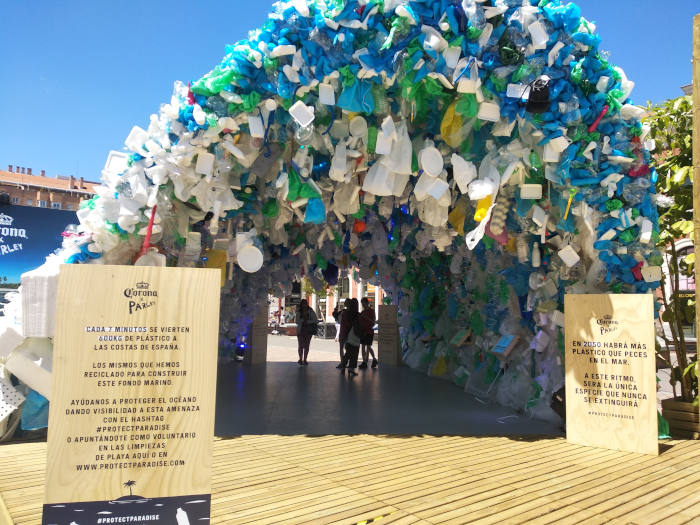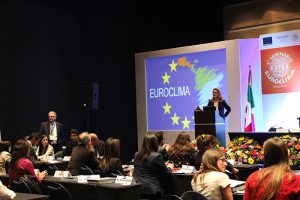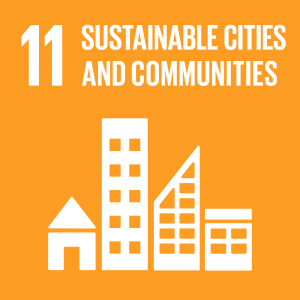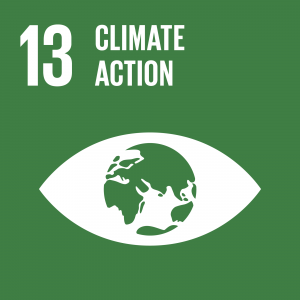-
|
27 June 2019
|Posteado en : Reportage
On the occasion of World Environment Day, celebrated on 5 June, and World Oceans Day, commemorated on 8 June, we highlight the situation and the consequences environmental pollution is currently having and how FIIAPP, through various projects it manages, is helping in the fight to protect the environment
According to the World Health Organization (WHO), environmental pollution has reached alarming proportions, in figures, 9 out of 10 people breathe toxic air and 7 million die every year from environmental and domestic pollution.
The Director General of the WHO, Tedros Adhanom Ghebreyesus, points out that “air pollution poses a threat to everyone, although the poorest and most marginalised people are worst affected”. In this regard, the WHO notes that over 90% of deaths related to air pollution occur in low and middle income countries, mainly in Asia and Africa, followed by low and middle income countries in the Eastern Mediterranean Region, Europe and the Americas.
Air pollution is considered an important risk factor, especially for noncommunicable diseases. The data show that it causes a quarter (24%) of adult deaths from heart disease, 25% of deaths from strokes, 43% of deaths from chronic obstructive pulmonary disease and 29% of deaths due to lung cancer.
Also, according to a study published in the ‘European Heart Journal‘, pollution is responsible for 800,000 deaths a year in Europe and 8.8 million worldwide.
World Environment Day
The first conference related to environmental issues was held in Stockholm from 5 to 16 June 1972 under the auspices of the United Nations. This meeting is known as the Conference on the Human Environment and its objective was to achieve a common vision on basic aspects related to protecting and improving the human environment.
On 15 December 1972, the General Assembly adopted a resolution that designated 5 June as World Environment Day. In addition, on that same day, the General Assembly approved another resolution that led to the creation of the United Nations Environment Program (UNEP).
In 2019, World Environment Day has focused on air pollution. “It’s time to act forcefully. My message to governments is clear: tax pollution, stop subsidising fossil fuels and stop building new coal plants. We need a green economy, not a grey economy, “the Secretary General of the United Nations, Antonio Guterres, highlighted in his speech.
SDG 13: Adopt urgent measures to combat climate change and its effects
In order to strengthen the global response to the threat of climate change, countries adopted the Paris Agreement at COP21, which entered into force in 2016. In it, the countries committed themselves to work to limit the increase in global temperature to less than two degrees Celsius.
The targets that are intended to achieve this Sustainable Development Goal include: strengthen the resilience and ability to adapt to the risks related to climate and natural disasters; improve education and awareness of climate change mitigation; put the Green Climate Fund into operation by capitalising on it as soon as possible and increase capacity for effective planning and management in relation to climate change in the least developed countries.
World Oceans Day
The United Nations General Assembly designated 8 June as World Oceans Day. The oceans cover more than 70% of the Earth’s surface. However, only 1% of this area is protected. In addition, the oceans contain 96% of the Earth’s water and absorb around 25% of the CO2 that is added to the atmosphere year after year due to human activity, thus reducing the impact of this greenhouse gas on the climate.
“In the last 150 years, approximately half of live corals have been lost. Pollution by plastic in the oceans has multiplied tenfold in the last 40 years. One third of fish stocks are overexploited. The dead zones – submarine deserts where life does not prosper due to a lack of oxygen – are increasing rapidly, both in size and in number, “said Antonio Guterres.
SDG 14: Oceans, Seas and Marine Resources
The Oceans Conference was held between 5 and 9 June 2017, it was the first United Nations conference to work towards achieving SDG 14, its objective was to conserve and sustainably use the oceans, seas and marine resources through sustainable development.

Recreation of kilos of plastics in the oceans, made by Corona x Parley in Madrid In addition, this Sustainable Development Goal has a number of targets including the following: prevent and reduce marine pollution of all kinds; regulate fishing exploitation and end overfishing, illegal, unreported and unregulated fishing and destructive fishing practices; conserve at least 10% of coastal and marine areas in accordance with national laws and international law; and facilitate the access by small-scale artisanal fishermen to marine resources and markets.
At present, various brands are reflecting the problem that our seas currently suffer in their advertising campaigns. For example, the Reina Sofía Foundation has presented an animated short film, Lemon, which represents the problem of plastics in nature.
According to scientists, by 2050 there will be more plastic than fish in the sea. They also warn that one million seabirds and 100,000 marine mammals die each year as a result of plastic contamination. And, as if that were not enough, they highlight that microplastics have been found in 70% of the salt, molluscs and crustaceans we consume in our country.
FIIAPP and its contribution to the environment
FIIAPP manages several projects focused on caring for the environment. The EUROCLIMA+ programme is funded by the European Union and the climate governance component is managed by FIIAPP. It aims to promote environmentally sustainable and climate-resilient development in 18 Latin American countries, because greenhouse gas emissions from urban transport in the region continue to increase.
If we talk about climate change, Beatriz García-Pozuelo, EUROCLIMA+ senior technician, points out that “it is expected that by 2100 the temperature in Madrid will have increased by 4 ºC. This means that living in Madrid would be more like living in Saudi Arabia or the Arab Emirates.”
In addition, FIIAPP manages Cuba-renewable, a project to promote renewable energy sources and energy efficiency in Cuba. This project supports the effective implementation of the policy for the prospective development of renewable energy sources and efficient energy use and an appropriate regulatory framework.
“The use of renewable energy has created mountain hospitals, rural schools and, ultimately, allowed the population to access energy in a more equitable manner,” says Maite Jaramillo, coordinator of the Cuba-Renovables project. In addition, she points out that, as Cuba is a country rich in renewable resources, the development of these resources “would make an important contribution to the environment”.
In addition, the Assistance Programme against Transnational Organised Crime, El PAcCTO, is implementing various activities among security forces and bodies in Europe, Latin America and internationally in order to promote joint policies to combat environmental crimes.
Similarly, the project ‘Accountability, Rule of Law and Anti-Corruption in Ghana’, ARAP-Ghana, whose representatives at Ghanian Public Prosecutor’s Office and Environmental Protection Agency have visited Spain in order to acquire knowledge and good practices in the field of environmental crimes.
-
|
28 February 2019
|Posteado en : Reportage
Climate change is increasingly evident. The FIIAPP is committed to sustainability through two projects focused on renewable energies and climate change: Cuba-Renewables and EUROCLIMA +.
Renewable energies are clean, inexhaustible resources provided by nature. Unlike fossil fuels, producing energy this way does not emit greenhouse gases or pollution, so it does not affect climate change.
At the Paris Climate Change Conference held in December 2015, otherwise known as COP21, 195 countries signed the world’s first binding climate agreement. This agreement establishes a global action plan to keep global warming below 2ºC between 2020 and 2030.
According to the International Renewable Energy Agency, IRENA, if the share of renewable energies in the global energy scenario were doubled to 32% in 2030, this would improve wellbeing by 3.7% and increase employment in the sector to more than 24 million people.
There are numerous sources of renewable energy such as wind energy, solar energy (obtained from the sun), and hydro energy (obtained from rivers and freshwater flows), biomass and biogas (from organic matter), geothermal energy (obtained from the interior of the Earth), tidal energy, wave energy, bioethanol (obtained by fermenting vegetable products) and biodiesel (obtained from vegetable oils).
Renewable energy accounts for 46.7% of installed capacity in Spain. According to data extracted from the Report on the Spanish electricity system 2018 published by Red Eléctrica de España in 2018, renewable generation on the Peninsula increased from 33.7% to 40.1%.
What are the advantages of renewable energies?
As we have already said, renewable energy production does not emit greenhouse gases, so it’s a clean solution that avoids environmental damage and does not affect climate change.
Unlike traditional energy sources, renewable energies are also inexhaustible. These energies are as available as the sun they originate from and adapt to natural cycles .
Because they are developed in the regions where they are installed, they make regions more energy-autonomous.
Nor do they entail any risks to health since they are obtained naturally and can be used in all circumstances.
Transition to 100% renewable energy sources
LUT University and the Energy Watch Group have published a report that shows the viability of a European energy transition towards 100% renewable sources. This study shows what it would mean to start using 100% renewable energy sources as opposed to those currently available, eliminating fossil fuels in all sectors before 2050.
The study also highlights that electricity generation in the 100% renewable energy system will consist of a combination of solar, photovoltaic, wind, hydroelectric, bioenergy and geothermal energy sources .
The data published in this study “demonstrate that Europe can switch to a zero-emission energy system . Therefore, European leaders can and must do far more to protect the climate than what is on the table today”, said Hans-Josef Fell, chairman of the Energy Watch Group.
EUROCLIMA + and Cuba-Renovables
The FIIAPP participates in the management of two projects focused on climate change and renewable energies. On the one hand, the EUROCLIMA + programme, funded by the European Union, aims to promote environmentally sustainable and climate-resilient development in 18 Latin American countries, because in this region urban transport shows a continuous increase in greenhouse gas emissions.
“The fact that most of the population lives in cities, the use of public transport and a high index of renewable energy in the energy matrix, make Latin America an excellent scenario for sustainable mobility”, said Horst Pilger, sector head of the General Directorate of International Cooperation and Development of the European Union during COP24, held in December 2018.
On the other hand, the project for the promotion of renewable energy sources and energy efficiency in Cuba, developed as a cooperation strategy between the EU and Cuba, also known as Cuba-Renovables, supports the effective implementation of the policy for the development perspective of renewable sources of energy and the efficient use of energy and its regulatory framework.

Photograph taken in Cuba by Maite Jaramillo, coordinator of the Cuba-Renovables project “We mustn’t forget that Cuba is a country rich in renewable resources and dependent on external fossil resources. Therefore, developing renewable energies would make an important contribution to the environment, and mean energy independence for the island, “says Maite Jaramillo, coordinator of the Cuba-Renovables project.
Likewise, “the FIIAPP will contribute with experts’ exchanges and based on the work experience we already have in the country and the understanding we have with Cuba. In addition, it will contribute to the creation of networks in the sector”, he says.
SDG 7: Guarantee access to affordable, safe, sustainable and modern energy for all.
In 2015, world leaders adopted a series of global objectives, known as Sustainable Development Goals (SDG), which aim to eradicate poverty, protect the planet and improve citizens’ rights. In the case of renewable energies, these are mentioned in SDG number seven, which aims to guarantee access to affordable, reliable, sustainable and modern energy for all.
“Energy is the main contributor to climate change, accounting for around 60% of all global greenhouse gas emissions”, says the United Nations in a report on this SDG.
-
|
20 September 2018
|Posteado en : Interview
Alexandra Cortés, expert in Communication and Visibility of EUROCLIMA+, tells us what the keys of the programme against climate change in Latin America are
What is EUROCLIMA+?
EUROCLIMA+ is a programme funded by the European Union offering a wide range of specialized services aimed at supporting the implementation of the commitments of the Paris Agreement in the field of climate governance, as well as the funding and technical assistance for the execution of projects with Latin American countries.
The implementation of these projects is carried out through the synergistic work of cooperation agencies of member countries of the European Union, together with two agencies of the United Nations ( UN ).
What are the objectives of the programme?
The programme seeks to promote environmentally sustainable development in 18 countries in Latin America, in particular, for the benefit of the most vulnerable populations. In addition, it supports countries in the implementation of the commitments established through the Paris Agreement on climate change.
What does each of the agencies that manage the programme do?
The spectrum of topics covered by EUROCLIMA+ includes the main development areas that are part of the climate change agenda. These issues are driven by the vast experience of the agencies implementing the programme, selected on the basis of their experience in the field of climate change, the environment and sustainable development in Latin America.
One or several agencies deal with each of the components of the programme. Therefore, the FIIAPP works on Climate Governance with the Economic Commission for Latin America ( ECLAC ), UN Environment and the German Society for International Cooperation ( GIZ ). The German agency also deals with the component of Forests, biodiversity and ecosystems, energy efficiency, together with Expertise France, for Resilient Food Production, also with the French institution, and Urban Mobility , with the French Agency for Development ( AFD ). The latter also works with the Spanish Agency for International Cooperation for Development ( AECID ) on the components of Energy Efficiency, Water Management from an Urban Perspective and Disaster Risk Management.
What does the joint work of all these institutions contribute?
The joint work of the different implementing agencies provides a broad and complementary experience in the field of climate change and sustainable development. It also promotes the exchange between Europe and Latin America, shortening distances and promoting synergies.
And the work of the FIIAPP in particular?
The FIIAPP leads the implementation of the Climate Governance component, accompanying the countries in the design, updating or implementation of climate policies. This will help Latin American countries reach 2020 with updated legislation and plans adapted to their realities.
Specifically, the Foundation facilitates dialogue on climate policies and provides technical and financial support for the development and implementation of policies, plans, measures and tools for adaptation and mitigation of climate change in Latin America. It works by directly supporting the governments of the different countries, with actions oriented at their strategic and direct demands designed jointly with the Latin American institutions within the framework of the EUROCLIMA+ programme.
According to the topics of greatest interest in the region and considering the context and the main challenges involved in facing up to climate change, the action lines of the component would be the implementation of NDCs, climate services, climate financing, education, communication and participation, and gender.
The key tools at the service of the 18 participating Latin American countries are those of collaboration between institutions, the search for synergies, joint learning and the exchange of information and best practices. To this end, the horizontal component offers both European and Latin American experiences in this area. In addition, it strengthens the capacities of Public Administration personnel, as well as other persons involved, including civil society.
What are the challenges of EUROCLIMA+?
EUROCLIMA+ works in an innovative, intersectoral and multi-stakeholder environment. The initiatives are identified and planned through participatory mechanisms. It encourages dialogue and regional exchange, ensuring that Latin American countries share best practices and lessons learned.
The programme provides services to the governments of Latin America based on their needs, seeking to promote political dialogue, knowledge management, capacity development, education and awareness of climate change. EUROCLIMA+ is driven by demand. It brings together experiences from Europe and Latin America, as well as the experience of the specialized agencies of the United Nations, it supports South-South cooperation and joint learning processes.
Given this scenario, one of the main challenges of the Programme is precisely the synergistic work with 18 countries in Latin America, a region in which many strengths and needs are shared, while at the same time presenting great differences, marked by their history, culture, politics and interaction between the nations themselves.
-
|
15 February 2018
|Posteado en : Reportage
Cities are becoming key hubs from which to fight climate change. In Latin America, Euroclima+ supports mitigation policies to reduce emissions
When pollution levels increase, public transport in Paris is free. And only “clean” vehicles can enter the city. In Brussels and Copenhagen, priority is given to bicycles. Or the speed limit is reduced, as in Madrid. While London, Oslo and Stockholm use tolls to restrict traffic.
Other measures taken by the transport sector to reduce urban air pollution include prizes for green cars and controlling traffic flow and parking, encouraging car sharing and public transport. Urban air pollution is one of the most visible effects of climate change in cities around the world.
Outside of Europe, Tokyo monitors pollution in real time, with indexes that can be viewed online. Checks on the street, fines and lists of offenders are some of the other measures taken in one of the most populated cities in the world.
And the majority of the world population lives in cities. Making the adoption of an urban perspective on climate change necessary, as it is estimated that 70% of the population will be urban in 2050. Uses associated with the network of cities produce more than 70% of CO2 emissions.
Climate change and health
An article reflects on whether we are aware of what urban air pollution means. On whether we are aware that poor air quality affects our health. And on whether we are aware that it causes thousands of premature deaths a year. And it is backed up by data: 1,032,833 deaths per year in China, 621,138 in India, 54,507 in Ukraine, 32,668 in Turkey, 26,241 in Brazil, 26,160 in Germany and 16,798 in Mexico.
Euroclima+, the European Union-financed programme to tackle climate change in Latin America, supports the development of mitigation policies directly related to the reduction of greenhouse gases and other emissions.

Euroclima+ meeting in Chile In addition, other specific plans with this objective are being developed in the industrial and transport sectors. They are necessary because a growing population means that current production and consumption patterns are running up against limited resources. A calculation of the ecological footprint shows that if no action is taken by 2030 we will need the equivalent of two planet Earths to cover our needs.
The programme is present in 18 Latin American countries and works in accordance with the United Nations Convention on Climate Change and according to the needs of a region that hosts some of those expanding cities.
Climate change in the Sustainable Development Goals
The climate governance component of Euroclima+ is being led by FIIAPP. Another of the programme’s tasks is to evaluate these climate policies, which will allow the associated actions to be redefined or redesigned in accordance with the framework agreements or compliance with the Sustainable Development Goals (SDG). These are the 17 goals several world leaders established in 2015 for a better world in 2030. And which, in summary, aim to “end poverty, fight inequality and stop climate change”.
Among them, number 11 refers to “sustainable cities” with a section on “environmental impacts” and number 13 focuses on action against climate change.–– But, how are things progressing with them?


The European Union is studying progress towards these goals. In its latest study (Sustainable development in the European Union, 2017) it determined that the concentration of population and industry continues to be a risk for air quality. Despite the advances, the levels of air pollution continue to be above those recommended by the World Health Organization (WHO).
However, as part of its strategy for 2020, the EU set the goal of reducing greenhouse gas emissions by 20%, compared to 1990. The goal for 2015 has already been exceeded, with a reduction of 22%.
The cities are also commited
In this context, cities are aware they need to be involved. And they advocated this at the last UN Climate Summit (COP23), held in Bonn in November 2017, by calling for more tools to combat climate change.
Specifically, the reduction of greenhouse gas emissions was addressed with the ultimate aim of slowing down global warming. The objective remains that terrestrial temperatures do not increase more than 2 ºC by 2050. To achieve this, emissions must be reduced by 80%.
Euroclima+ also attended the meeting, where it met with ministers from several countries in the region to follow up on the objectives they have already committed to under the Paris Agreement (COP21) and to strengthen the dialogue on climate policies.
Many of the cities that met in Bonn also belong to the C40 network, which brings together more than 90 cities to combat the impacts of climate change by working collaboratively. The main objectives include “reducing greenhouse gases and increasing the health and well-being of citizens”.
This network alone represents “more than 650 million people and a quarter of the world economy”, making cities a priority when it comes to addressing this problem.
An example of this commitment is reflected in the short documentary released on the internet on the work of 6 cities: Bogota, Cape Town, New York, Paris, Portland and Seoul.
In reality, the next step is for us, as individuals, to also be aware that these measures are not intended to make our lives more difficult. On the contrary, they will allow us to live in the future.
The trick is to change some habits, with small gestures, however insignificant they may seem. More than 7,000 million small gestures can defeat climate change.




